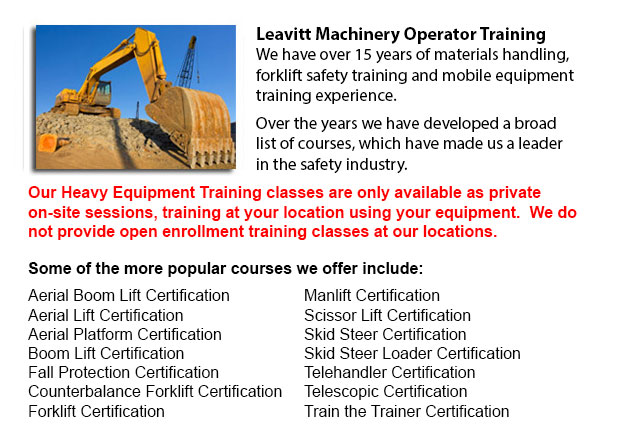
Heavy Equipment Safety Training Saskatchewan - Heavy equipment safety training is a very important training for those individuals and involved in industrial environments. For individuals who employ the operators using heavy machines as a part of their operations will find heavy equipment safety as a particularly essential topic. For instance, people who work in the mining field usually make use of heavy machines to perform different aspects of the work. The agricultural and construction industries are also prevalent businesses that rely on such machinery.
When making use of heavy machines incorrectly, this can lead to severe injuries and even fatalities leading to the necessity of operators to follow safety measures when operating these machines and the completion of training required for the operation of such equipment. There might be orientation concerning the use of specific equipment and recommended protective gear. Being sensible around such dangerous machines is always a good rule of thumb.
Basic training about the use of the machinery and the possible associated dangers is usually needed as part of heavy equipment safety measures for the individuals working around the vicinity or operating such machinery. It is necessary that employees learn how to correctly interpret the different signs that are required legally to serve as a guide for worker safety. These signs often should be present and visibly posted around the workplace.
These safety signs show areas that are restricted to pedestrians due to the constant traffic of heavy machines, as common in wharves and shipyard environments. Here, people are always being exposed to cranes and forklifts which are responsible for loading or offloading supplies onto designated places. Typically, in these situations, there are safety precautions and warning signs which apply to both the pedestrians as well as the operators of the heavy machinery.
Heavy machine operators often need to adhere to strict regulations and heavy equipment safety measures in order to avoid accidents from taking place. Some requirements may consist of making certain the operator is not under the influence of whichever drugs or debilitating substances and that they are mentally alert.
There are usually guidelines set out by the manufacturers regarding safety precautions like for instance the maximum load limits of a particular piece of equipment. Most countries have established laws about the maximum number of weekly hours workers can work in a single shift in order to avoid whatever kind of accident that may be the result of tiredness. Heavy machine operators are required in North America to complete a heavy equipment safety training course.
-
Forklift Ticket Saskatchewan
Forklift Ticket Saskatchewan - Pallet jacks and forklifts are both meant for basically the same purpose; to move supplies from one location of your warehouse to another. This is pretty much where the comparison stops however. With the pallet jack, th... More -
Loader Ticket Saskatchewan
Loader Ticket Saskatchewan - Gehl articulated loaders have been made to suit practically any condition. They provide great traction and optimal maneuverability due to a heavy-duty oscillating joint that offers forty five degree rotating angles left a... More -
Forklift Training Programs Saskatchewan
Forklift Training Programs Saskatchewan - Are you searching for work as a forklift driver? Our regulatory-compliant mobile equipment operator training provides instruction in kinds of forklifts, pre-shift check, fuel kinds and handling of fuels, and... More -
Heavy Equipment Operator Classes Saskatchewan
Heavy Equipment Operator Classes Saskatchewan - A heavy equipment operator is an individual who has received the right training in order to operate a particular kind or piece of machinery. There are lots of ways for the operator to undergo training a... More -
Telehandler Training in Saskatchewan
Telescopic handlers usually known as telehandlers for short, are an extremely popular piece of heavy construction equipment. They are usually utilized in the construction and agricultural trades. These equipments have farthest reaching capacity and a... More -
Narrow Aisle Forklift / Order Picker Training / Electric Pallet Jack / Electric Pallet Truck Training in Saskatchewan
A pallet lift is a piece of equipment dedicated in the transporting of pallets of various dimensions and weights. They can be utilized as an attachment for forklifts, cranes and other types of heavy machinery or be applied on their own. Pallet lifts... More -
Operator Safety Training, Re-Qualification Training, In-House Instructor Training in Saskatchewan
Used in just about all industrial construction sites, warehouse operations or boat yards, the lift truck is a very important component so as to help pick up and transfer supplies. The reach feature of a forklift can help improve the applications whic... More -
Aerial Lift Ticket Saskatchewan
Aerial Lift Ticket Saskatchewan - Boom vehicle are often used by phone, cable and utilities firms as they have extended folded arms which are generally folded over the roofs of business vehicles. On the end of the extension of extendable arms usually... More

Forklift Training Saskatchewan
TOLL FREE: 1-888-254-6157
Saskatoon, Saskatchewan
forklifttrainingsaskatchewan.com
Email Us
About Us



